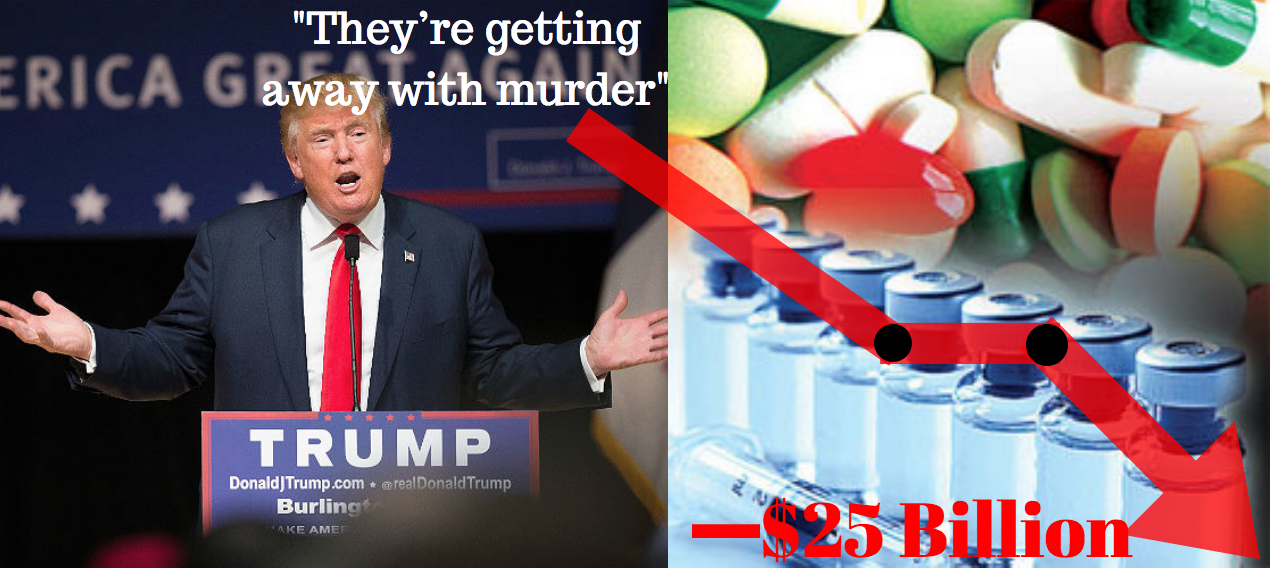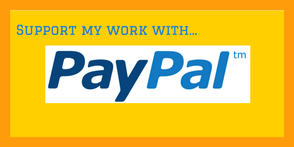On December 7, President-elect Donald Trump first hinted to pharmaceutical companies that their days of fleecing the public may be numbered. In an interview with Time Magazine for the "Person of the Year" cover story, Trump said, "I'm going to bring down drug prices. I don't like what has happened with drug prices.” At that time, both the Nasdaq Biotech ETF (IBB) and S&P Biotech ETF (XBI) fell about 4% on Trump’s statement alone. Fast forward to Trump’s recent press conference on January 12 — the one in which he shunned a CNN reporter’s question and rightfully called the outlet fake news — where he further addressed the issue.
Here’s the excerpt:
“We have to get our drug industry coming back. Our drug industry has been disastrous. They’re leaving left and right. They supply our drugs but they don’t make them here, to a large extent. And the other thing we have to do is create new bidding procedures for the drug industry. They’re getting away with murder. Pharma has a lot of…lobbyists and a lot of power and there’s very little bidding on drugs.
“We’re the largest buyer of drugs in the world, and yet we don’t bid properly. We’re going to start bidding. We’re going to save billions of dollars over a period of time.”
Immediately after, both Pharma and Biotech stocks experienced their biggest plunge since Brexit in June 2016 while wiping out their entire 2017 rally. Trump’s statement channeled longtime opponent of monopolistic drug companies Bernie Sanders as well as generations of Americans.
As a business man, Trump is looking to make a better deal with the drug industry. What if the prices of pharmaceutical drugs aren't the root of the problem? What if the entire, establishment mainstream medical model is broken?
PAINKILLER EPIDEMIC
Much of the US is in the throes of an opioid epidemic, and the blame has been placed with federal regulators of pharmaceuticals, to the doctors prescribing the painkillers, and to the industry itself. Price points of the drugs will have little difference on combating the opioid epidemic for the common person struggling.
False claims and doctored studies allowed Connecticut-based Purdue Pharma, the makers of OxyContin to advertise the drug as a 12-hour pain reliever. However, even before its approval, studies showed the claims were untrue while Purdue Pharma downplayed the drug’s addictive tendencies. As OxyContin is a chemical cousin of heroin, many addicted users whose opioid painkiller prescriptions end switch to its street drug alternative. A report from the CDC found that the drug problem has become so deadly that heroin deaths outnumbered gun fatalities last year for the first time in US history. Always late to the party, the US Food and Drug Administration announced that painkillers such as oxycodone and fentanyl will now have to carry a "black box" warning about the risk of abuse, addiction, overdose and death...that should fix everything.
CONFLICTS OF INTEREST
The public has watched the revolving doors as members of US regulatory agencies get their golden ticket to big pharma positions. Julie Gerberding went from director of the US Centers for Disease Control and Prevention (CDC) to president of Merck's vaccines division in 2009. During Gerberding's time at the CDC, she oversaw and covered for the agency's alleged research fraud regarding vaccine safety studies as told by CDC Whistleblower Dr. William Thompson; later told in the documentary film Vaxxed: From Cover-Up to Catastrophe.
Sacramento Senator Richard Pan co-authored the highly protested California Senate Bill 277 forcing a CDC-mandated schedule of vaccines on all the state’s school children regardless of parent's wishes. While the bill was being decided on, Pan repeatedly turned to the pharmaceutical lobbyists present — ignoring the capacity crowd of parents behind him and protesting outside — to get his marching orders to pass the bill. Pan has recently floated a bill (SB18) that will make it legal for the state of California to intervene at many levels of the child-parent relationship including healthcare decisions.
Medical journals are not immune to pharmaceutical company conflicts of interest, influence, and naked censorship. In August 2015, an already peer-reviewed, revised after review, and then accepted study showing behavioral abnormalities after the questionable Human Papilloma Virus (HPV) vaccine was administered was then pulled from the medical journal Vaccine. The journal’s Editor-in-Chief Dr. Gregory Poland, who pulled the study, has conducted four studies to date with direct affiliation to pharmaceutical giant and HPV vaccine manufacturer Merck. None of the deeply imbedded conflicts of interests that continually exist will be changed by making drug prices more reasonable and competitive.
LOSS OF INFORMED CONSENT
The medical community in the US, and internationally, has undergone an erosion of the very pillars that it once based itself on. Informed consent and the freedom of patient choice have fallen victim to pharmaceutical company bottom lines. Doctors and politicians have sold out their professions to drug company directives. Drug and vaccine inserts, deadly interactions, and newly discovered information and studies are commonly ignored by establishment health professionals who often get a financial cut of the pharmaceutical products they can push on their patients.
Doctors who don't tow the drug company line and speak the correct talking points are increasingly targeted for review and persecution by medical boards. The persecution has become so commonplace that health and law professionals have formed the nonprofit Physicians for Informed Consent to protect themselves and to protect the pillar of informed consent.
Parents who choose to provide, evidence-based alternative treatments to their children are increasingly being scrutinized and targeted by government. Medical kidnap is a dark secret and a practice allowing the state to target children using the excuse of parents choosing health freedom and exercising parental choice. Sacramento Senator Pan's SB18 is predicted to amplify this unwanted and unwarranted state intervention.
REGULATORY AGENCY CAPTURE
Robert F. Kennedy Jr., the unofficial head of Trump’s new commission on Vaccine Safety and Scientific Integrity, said it best when held up the CDC as a perfect example of regulatory capture. The agency has been little more than a public relations arm for pharmaceutical company interests seeing revolving doors and research scandals. It was the drug companies who lobbied for liability-free vaccines — their largest revenue stream — and were awarded the protection from individual legal action by the National Childhood Vaccine Injury Act of 1986. The reality is the Vaccine Adverse Events Reporting System (VAERS) is broken, the medical community is uneducated and is underreporting vaccine injury, and the multibillion dollar vaccine industry has little incentive to ensure safety.
Another agency no longer taken seriously is the Drug Enforcement Agency (DEA) whose recent non-rescheduling of cannabis has allowed the majority of Americans to understand that cannabis is still listed as schedule 1 to protect drug company profits. On the heels of the cannabis double-down announcement, the DEA pushed its luck by going after the plant supplement Kratom. However a rapid, critical mass of people pushed back the power grab seeing the DEA’s move as it truly was; an organized crime initiative to remove competition to the drug company's longtime opioid market monopoly.
It is estimated the government could save up to $16 billion annually if it simply was allowed to negotiate with pharmaceutical companies for the prices. The final message to Donald Trump as he appears to be starting a war against the criminal pharmaceutical-industrial complex is simply this …keep going.
Here’s the excerpt:
“We have to get our drug industry coming back. Our drug industry has been disastrous. They’re leaving left and right. They supply our drugs but they don’t make them here, to a large extent. And the other thing we have to do is create new bidding procedures for the drug industry. They’re getting away with murder. Pharma has a lot of…lobbyists and a lot of power and there’s very little bidding on drugs.
“We’re the largest buyer of drugs in the world, and yet we don’t bid properly. We’re going to start bidding. We’re going to save billions of dollars over a period of time.”
Immediately after, both Pharma and Biotech stocks experienced their biggest plunge since Brexit in June 2016 while wiping out their entire 2017 rally. Trump’s statement channeled longtime opponent of monopolistic drug companies Bernie Sanders as well as generations of Americans.
As a business man, Trump is looking to make a better deal with the drug industry. What if the prices of pharmaceutical drugs aren't the root of the problem? What if the entire, establishment mainstream medical model is broken?
PAINKILLER EPIDEMIC
Much of the US is in the throes of an opioid epidemic, and the blame has been placed with federal regulators of pharmaceuticals, to the doctors prescribing the painkillers, and to the industry itself. Price points of the drugs will have little difference on combating the opioid epidemic for the common person struggling.
False claims and doctored studies allowed Connecticut-based Purdue Pharma, the makers of OxyContin to advertise the drug as a 12-hour pain reliever. However, even before its approval, studies showed the claims were untrue while Purdue Pharma downplayed the drug’s addictive tendencies. As OxyContin is a chemical cousin of heroin, many addicted users whose opioid painkiller prescriptions end switch to its street drug alternative. A report from the CDC found that the drug problem has become so deadly that heroin deaths outnumbered gun fatalities last year for the first time in US history. Always late to the party, the US Food and Drug Administration announced that painkillers such as oxycodone and fentanyl will now have to carry a "black box" warning about the risk of abuse, addiction, overdose and death...that should fix everything.
CONFLICTS OF INTEREST
The public has watched the revolving doors as members of US regulatory agencies get their golden ticket to big pharma positions. Julie Gerberding went from director of the US Centers for Disease Control and Prevention (CDC) to president of Merck's vaccines division in 2009. During Gerberding's time at the CDC, she oversaw and covered for the agency's alleged research fraud regarding vaccine safety studies as told by CDC Whistleblower Dr. William Thompson; later told in the documentary film Vaxxed: From Cover-Up to Catastrophe.
Sacramento Senator Richard Pan co-authored the highly protested California Senate Bill 277 forcing a CDC-mandated schedule of vaccines on all the state’s school children regardless of parent's wishes. While the bill was being decided on, Pan repeatedly turned to the pharmaceutical lobbyists present — ignoring the capacity crowd of parents behind him and protesting outside — to get his marching orders to pass the bill. Pan has recently floated a bill (SB18) that will make it legal for the state of California to intervene at many levels of the child-parent relationship including healthcare decisions.
Medical journals are not immune to pharmaceutical company conflicts of interest, influence, and naked censorship. In August 2015, an already peer-reviewed, revised after review, and then accepted study showing behavioral abnormalities after the questionable Human Papilloma Virus (HPV) vaccine was administered was then pulled from the medical journal Vaccine. The journal’s Editor-in-Chief Dr. Gregory Poland, who pulled the study, has conducted four studies to date with direct affiliation to pharmaceutical giant and HPV vaccine manufacturer Merck. None of the deeply imbedded conflicts of interests that continually exist will be changed by making drug prices more reasonable and competitive.
LOSS OF INFORMED CONSENT
The medical community in the US, and internationally, has undergone an erosion of the very pillars that it once based itself on. Informed consent and the freedom of patient choice have fallen victim to pharmaceutical company bottom lines. Doctors and politicians have sold out their professions to drug company directives. Drug and vaccine inserts, deadly interactions, and newly discovered information and studies are commonly ignored by establishment health professionals who often get a financial cut of the pharmaceutical products they can push on their patients.
Doctors who don't tow the drug company line and speak the correct talking points are increasingly targeted for review and persecution by medical boards. The persecution has become so commonplace that health and law professionals have formed the nonprofit Physicians for Informed Consent to protect themselves and to protect the pillar of informed consent.
Parents who choose to provide, evidence-based alternative treatments to their children are increasingly being scrutinized and targeted by government. Medical kidnap is a dark secret and a practice allowing the state to target children using the excuse of parents choosing health freedom and exercising parental choice. Sacramento Senator Pan's SB18 is predicted to amplify this unwanted and unwarranted state intervention.
REGULATORY AGENCY CAPTURE
Robert F. Kennedy Jr., the unofficial head of Trump’s new commission on Vaccine Safety and Scientific Integrity, said it best when held up the CDC as a perfect example of regulatory capture. The agency has been little more than a public relations arm for pharmaceutical company interests seeing revolving doors and research scandals. It was the drug companies who lobbied for liability-free vaccines — their largest revenue stream — and were awarded the protection from individual legal action by the National Childhood Vaccine Injury Act of 1986. The reality is the Vaccine Adverse Events Reporting System (VAERS) is broken, the medical community is uneducated and is underreporting vaccine injury, and the multibillion dollar vaccine industry has little incentive to ensure safety.
Another agency no longer taken seriously is the Drug Enforcement Agency (DEA) whose recent non-rescheduling of cannabis has allowed the majority of Americans to understand that cannabis is still listed as schedule 1 to protect drug company profits. On the heels of the cannabis double-down announcement, the DEA pushed its luck by going after the plant supplement Kratom. However a rapid, critical mass of people pushed back the power grab seeing the DEA’s move as it truly was; an organized crime initiative to remove competition to the drug company's longtime opioid market monopoly.
It is estimated the government could save up to $16 billion annually if it simply was allowed to negotiate with pharmaceutical companies for the prices. The final message to Donald Trump as he appears to be starting a war against the criminal pharmaceutical-industrial complex is simply this …keep going.








 RSS Feed
RSS Feed